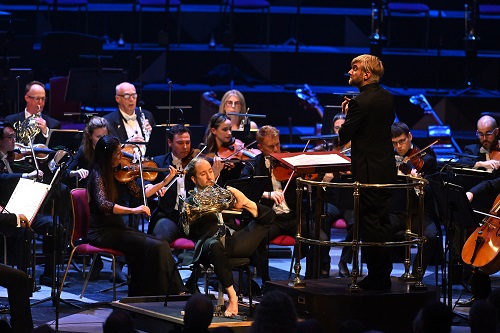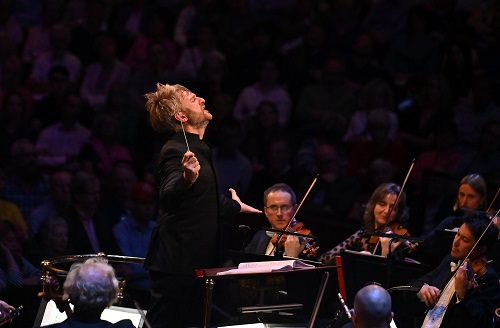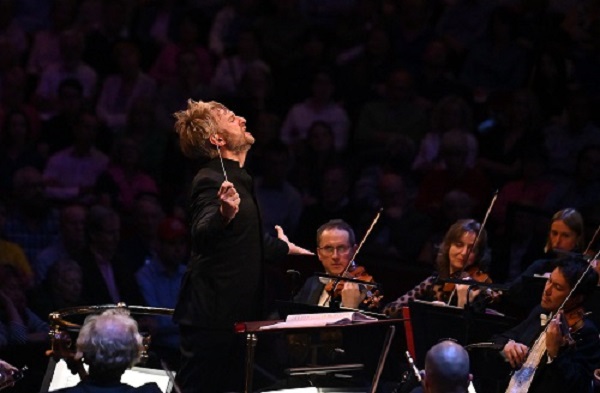
 United Kingdom Prom 24 – Karabits, Mozart, Rachmaninov: Felix Klieser (horn), Bournemouth Symphony Orchestra / Kirill Karabits (conductor). Royal Albert Hall, London, 24.7.2023. (CS)
United Kingdom Prom 24 – Karabits, Mozart, Rachmaninov: Felix Klieser (horn), Bournemouth Symphony Orchestra / Kirill Karabits (conductor). Royal Albert Hall, London, 24.7.2023. (CS)

Ivan Karabits – Concerto for Orchestra No.1, ‘A Musical Gift to Kyiv’ (UK premiere)
Mozart – Horn Concerto No.4 in E flat major, K495
Rachmaninov – Symphony No.2 in E minor, Op.27
The German French-horn player Felix Klieser has recently finished a two-year residency with the Bournemouth Symphony Orchestra. In 2021, he made his UK concerto debut with the orchestra; this concert, playing Mozart’s perennially popular Fourth Horn Concerto, was his Proms debut. One sensed from the performance that this has been a musical partnership that has brought much satisfaction and warmth to all involved.
Perhaps this review needs to begin by explaining that Klieser, born without arms, plays the French horn by mounting the instrument on a tripod and using his left foot to manipulate the keys, relying on his lips, tongue and breathing – rather than, as conventional, a hand in the bell – to control the tone and intonation. The resulting tone is beautiful, its projection absolutely steady: the prevailing impression of Klieser’s performance here was one of polish and assurance.
Kirill Karabits adopted a similarly urbane manner, using telling details – such as the slightest swelling of the orchestral horns’ held chord in the opening three bars of the Allegro moderato, for example – to add subtlety to the smoothness. If Klieser’s intonation took a little time to settle in the first solo passage, then that’s entirely understandable, and who would complain when there was such relaxed agility to enjoy. The minor-key episode had an appropriate note of gentle tension and Karabits built convincingly towards the recapitulation. Though his interpretative gestures were generally quite reserved, and perhaps a bit more ‘punch’ might have made for a more individualised reading, Klieser’s control of colour and dynamic in the first-movement cadenza was engaging. The Romanza was a model of elegance and poise, with some lovely pianos. The Rondo was light and unfussy.
It seems churlish to remark that while Klieser’s playing is beguiling, it’s not particularly characterful – that one might wish for more varied expressiveness. How does one ‘judge’ the music when the fact that it is brought into being at all is so incredible? And, if one might have wished for less restraint, then the horn player brought forth the charming innocence of Mozart’s music. I think the Prommers shared with me a sense that the astonishing triumph over adversity – the awareness that Klieser is doing something so completely out of the ordinary – was pushed to one side and replaced by a simple and heartfelt enjoyment of the music itself. And, I’m sure this is what he would wish. Klieser gave us some more Mozartian blithe wit with his encore: the third movement of the Second Concerto K417.
Karabits conducted Rachmaninov’s Second Symphony with the BSO at the Proms in 2011. Teeming with melodic riches, impassioned Romantic sonorities and harmonic heart-tugging, it seems a good choice with which to celebrate an incredibly fruitful musical partnership of fifteen years, and also to contribute to the Proms’ seasonal marking of the 150th anniversary of Rachmaninov’s birth. It’s not an ‘easy’ symphony to pull off, though: it’s long, at about an hour in length (we didn’t have the first-movement exposition repeat here – surely, we should have?), and tempos and the overall architectural complexity present at best an exciting challenge, at worst a headache, for a conductor – not least because there is a certain ‘uniformity’ of texture across the four movements.
Virgil Thomson described the Second Symphony as consisting of ‘mud and sugar’. We had neither of these extremes here, though, largely because Karabits’ conducting is so clear and incisive, and because he brought the score’s wealth of details to the fore – the way the strings were sometimes quelled so that we could luxuriate in the woodwinds solos, for example, comes to mind. He also forged the potentially saccharine, or turgid, unfoldings into a whole in which driving momentum and reflective sincerity were deftly balanced. There was no sense of Romantic verbosity and self-indulgence.

The opening Largo was quite slow, but still taut, and those long bass pedals were in anticipatory tension with violins’ thematic fragments and the cellos’ pizzicato forays, the horns making the first of many superb surging, and lyrical, contributions to the expressive blood-flow of the symphony. The cor anglais solo made time stand still but before we knew it the sway and swing of the Allegro moderato had swept us up in its embrace: the flexibility which Karabits applied on a micro level was brilliantly assimilated within an overall firmness, somehow achieving a sense of both taking one’s time and keeping the journey moving forward. One could appreciate the sumptuousness without wallowing in it, and there was grit as well as opulence in the contribution of the brass to that journey.
The Allegro moderato was airy and exciting, the strings’ cantabile ‘big theme’ in the Moderato a beguiling intrusion but never allowed to hold sway – velvet giving way to variegated colours and textures, and then to the violence of the fugue. Karabits’ accelerandos and transitions into the restatements of the main theme were brilliantly rousing in this movement.
Is the Adagio one of the most beautiful movements ever written? A Rachmaninovian apotheosis? To listen to clarinettist Barry Deacon might so convince one. Again, Karabits adopted a fairly broad tempo, but the melodic poetry unfolded organically. I performed this symphony fairly recently and can remember the feeling of slightly daunted loin-girding when turning to the first page of the concluding Allegro vivace. The movement is long and extravagant, its material diverse – requiring switches between vibrant exuberance, silky lusciousness and stormy tempest. It’s also brilliantly satisfying, especially when played with the sort of honest commitment and passion displayed by the BSO here. If they felt drained at the end, then they surely felt exhilarated too.
Karabits found and formulated light and shade over the hour-long expanse of the symphony, and in the final movement, especially, wove the threads together with insight, care and tastefulness. Indeed, if I were to express any quibble it might be that his approach to the work’s raw Romanticism was perhaps just a little too tasteful? No one wants a sensual swamp but could those brilliantly accomplished BSO strings have found just a bit more weight and exultancy at the sumptuous peaks? The climaxes, to my ears, do seem to depend on such string-based opulence.
Karabits may have been Chief Conductor of the BSO since 2008 but, while he’s been a regular visitor with the orchestra to the Proms, he’s made only infrequent appearances as a guest conductor – the capital’s loss. And, in his repertory choices for the BSO, Karabits has himself championed rarities, most particularly – as in his Voices from the East series – music composed by his fellow Ukrainians. The latter include his father, Ivan Karabits, who, before his untimely death in 2002 at the age of 57, was an important figure in the musical life of Ukraine, as a composer, teacher, and spokesperson for Ukrainian music and musicians.
The elder Karabits’ music synthesises various influences: Shostakovich, Stravinsky, Mahler and Rimsky-Korsakov among them. The most direct influence on his three Concertos for Orchestra, though, is his friend and mentor, the Russian composer Rodion Shchedrin, whose own Concertos for Orchestra No.4 and No.5 have been recorded by Karabits and the BSO on the Naxos label. In 2013, they also recorded all three of Karabits’ Concertos for Orchestra.
This Prom began with what was the UK premiere of the first Concerto, subtitled ‘A Musical Gift to Kyiv’. It was written to mark the 1500th anniversary of the city’s founding in 482AD, and is described by the composer’s son as ‘a symphonic portrait of the city, celebrating its history and beauty’ – a portrait composed with several places in mind: the Dnieper River and the St Volodymyr monument that overlooks it; the ruins of the medieval Golden Gate; St Sophia’s Cathedral and Monastery. With its carolling bells, brass fanfares, evocation of strummed folk gusli, and chorale-like fragments, it proved here to be a work – a little like Respighi’s Roman portraits – which makes one feel something of a flaneur, strolling through the city and relishing its sights and sounds, just as Karabits (and that means both of them!) celebrates and enjoys the work’s rich orchestral sonorities.
And, the orchestral timbres are striking from the first, with bright brass and tolling tubular bells bringing animation but also an invigorating tension. Each of the many instruments and sections – a panoply of percussion, celeste and two harps join the large forces – plays a distinct part in the kaleidoscope – a melange that Kirill Karabits’ meticulous approach made lucid and persuasive, as brassy flamboyance segued into the delicate wistfulness of the woodwind’s reflections, the latter then blooming lyrically in the strings’ melodising. In fact, the return of the bells brought about a profusion of melodies which explosively initiated the Presto second part – an improvisatory episode which abandons a strict tempo and leaves the conductor to decide when to bring in different instruments and how to layer them. Karabits really ratcheted up the excitement here – at one point the percussive tumult was tremendous! What was amazing was the way that what is in one sense ‘chaos’ was delivered with such calm authority. It’s enormously complicated music but it felt ‘accessible’ and ‘right’.
After such turbulence and drama, at the close the bells returned, fading into a surprising silence, one which Karabits held long – time suspended. The Prommers did not so much as twitch. Perhaps they were reflecting on the eternal endurance of Kyiv which that silence seemed to confirm.
Claire Seymour
This concert was broadcast live and can be heard on BBC Sounds and BBC iPlayer for 12 months. It will be shown on BBC Four on Sunday 13th August.
